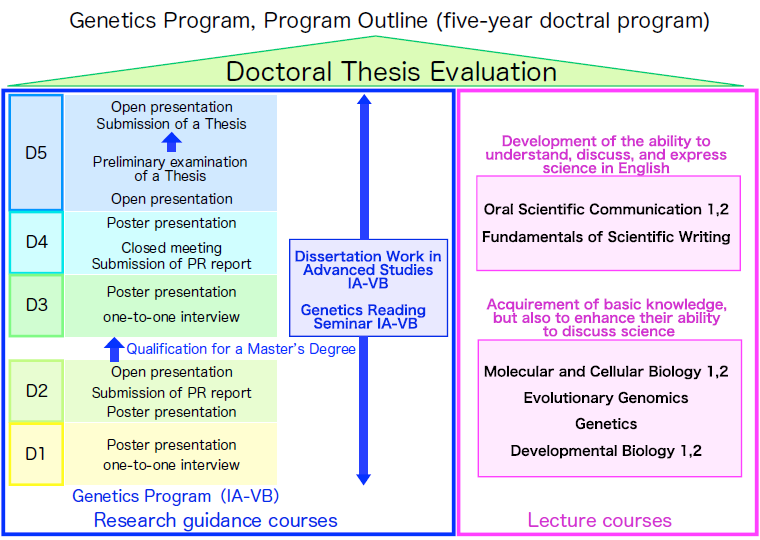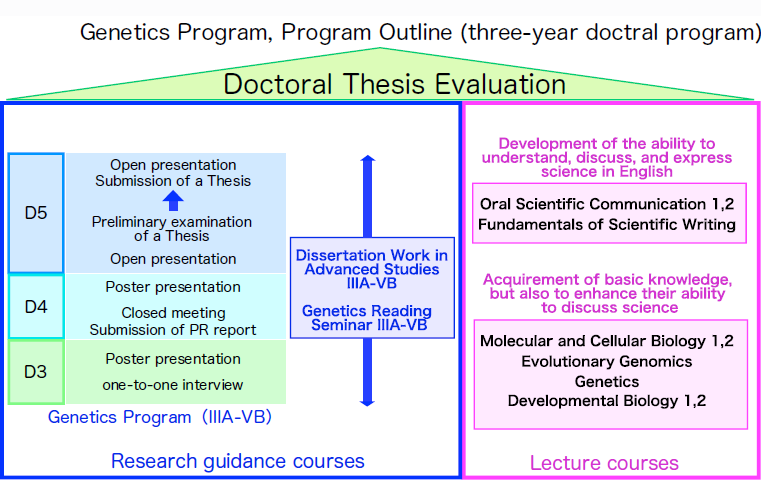Curriculum Policy
Courses at the Genetics Program are designed to provide training to become independent, creative scientists who are able to conduct research activity around the globe. The courses are organized to cover all the essential components of the degree criteria.
Organization of courses
1. advanced research skills
Students receive advice on their thesis research from faculty who are leading frontier research in various topics. This is accomplished through mentoring by the supervisor in “Dissertation Work in Advanced Studies I-V”, as well as discussion with the Progress Report Committee in ”Genetics Progress I-V”.
2. deep insight in various disciplines
Basic knowledge essential for students at the Genetics Program is provided by “Molecular and Cellular Biology 1,2”, “Evolutionary Genomics” and “Genetics”. These three recommended courses can be consecutively taken in two years, irrespective of the starting semester. Elective lecture courses in interdepartmental course groups are offered through a remote lecture system. Auditing lectures does not require course registration; sampling lectures from various disciplines is encouraged to help acquire knowledge that enables one to survey the field.
3. ability to comprehend, express and discuss science
The power to transmit research results can be developed through “Oral Scientific Communication 1” and “Fundamentals of Scientific Writing”. Skills to comprehend scientific seminars can be enhanced in “Oral Scientific Communication 2”. Discussion skills can be acquired through participating in the discussion-based “Developmental Biology 1,2”.
4. foresight into future research
By attending “Genetics Reading Seminar I-V” and “Genetics Seminar I-V”, students learn about various frontline researches and think about their implications.
5. research ethics
Ethical standards in research are trained through thesis research by the supervisor and annual seminars on Research Ethics for Prevention of Research Misconduct.
Education and learning procedures
To fulfil the degree requirements, students must take courses in a systematic balanced manner. The three courses, “Dissertation Work in Advanced Studies I-V”, “Genetics Progress I-V” and “Genetics Reading Seminar I-V” are essential components in education at the Genetics Program, so that students are required to take these courses in each and every semester. The subjects that all students at the Genetics Program should cover are provided by the recommended courses “Molecular and Cellular Biology 1,2”, “Evolutionary Genomics”, “Genetics” and “Developmental Biology 1,2”. The 5-year program students are recommended to take all these courses in the first two years of the program.
To obtain a doctoral degree, the 5-year program students must have obtained 42 credits or more, including 20 credits of “Dissertation Work in Advanced Studies IA-VB”, and the 3-year program students must have obtained 16 credits or more, including 12 credits of “Dissertation Work in Advanced Studies IIIA-VB”. Upon taking courses, students must read syllabi carefully and understand learning objectives and methods beforehand.
Evaluation of academic performances
At each course level, grades (A, B, C, D) are determined based on various viewpoints specified on the syllabus. In “Genetics Progress I-V”, in which research abilities of individual students are directly and objectively assessed, the Progress Committee writes a report about each student’s research performances and suggestions by the committee, and submits it to the student and his/her supervisor, in addition to the regular (A, B, C, D) grading. The report is shared by all the faculty at the Genetics Program.
In the 5-year program, students go through a qualifying exam for advancement from D2 to D3. This qualifying exam is conducted as a part of “Genetics Progress IIB”, in which the student’s knowledge in the field of life sciences and potential to become an independent researcher are assessed by four Progress Committee faculty members excluding the student’s supervisor, based on the research report submitted by the student, and his/her performances in the open research presentation and question-answer session. If one fails in the qualifying exam, one must retake “Genetics Progress IIB”.

















